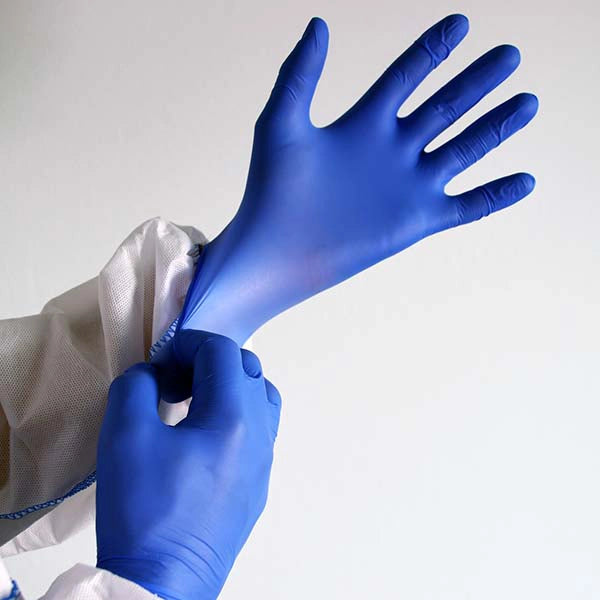Having a disposable glove is a prerequisite to many jobs that require you to handle chemicals that could be toxic or corrosive. Many people assume that this type of glove is impermeable to all chemicals and do not need to be concerned about the actual chemical resistance these gloves have. However, this line of thought is not necessarily true and can lead employees to believe that their gloves are more resistant than they actually are.
If a task at your workplace requires you to handle chemicals, but the gloves you are provided with are not heavy dut, and are likely to get damaged by the chemical, wouldn’t it make sense to wear something better?
Not all gloves are created equal, and that is true when it comes to chemical resistance. Chemicals will react differently with the material and surface of some gloves, but others do not have any effect on them at all. Certain chemicals are hazardous, making it necessary for workers in many industries to wear personal protective equipment like gloves.
When using gloves in your workplace, it is important to be aware of the chemical resistance these types of gloves do or don’t have.
Are Nitrile Gloves Chemical Resistant?
Disposable nitrile gloves are made with synthetic rubber material which means they are less susceptible to degradation than natural rubbers, but they are still not as versatile as a rubber made of polychloroprene. Nitrile gloves offer a balance of toughness and elasticity. Its resistance to chemicals makes it ideal for environments with harsh chemicals or caustic materials. This makes nitrile gloves good for short handling tasks that need special chemical protection against oils and chemicals.
Disposable nitrile gloves can resist alkaline solutions, as well as certain acidic solutions. Nitrile gloves are not good at resisting an extremely strong alkaline solution, however, because they may break down. Overall, nitrile gloves offer better acid resistance than latex and vinyl gloves.
However, acetone can dissolve nitrile gloves, as well as all other organic compounds, because acids and bases are good at dissolving other acids and bases.
Are Vinyl Gloves Chemical Resistant?
Vinyl gloves are popular, but they aren't suited to everyone's needs. They're often the least expensive option, but the quality is lower than that of latex and nitrile gloves.
A vinyl glove is perfect for short term use. It is not very durable and is not considered a suitable replacement for nitrile or latex gloves as they offer no protection at all from punctures and tears. While a vinyl glove offer some protection from water, it should never be worn while handling chemicals. A user generally only wears a vinyl glove for a very short period of time like 5 minutes or less compared to a nitrile glove which can be worn longer.
Again, a vinyl glove is great if you only need to use it for short periods of time. It is not resistant to many chemicals, though, so it shouldn't be used in environments where hazardous chemicals are being used. A vinyl glove is usually best when you just want to put it on to handle food and drink.
Are Latex Gloves Chemical Resistant?
Latex gloves are the most common type of glove used in many occupational settings. Latex is not resistant to chemicals, so a latex glove is mainly used in the food industry and the medical industry because it does protect well against bloodborne pathogens.
When it comes to chemicals, a latex glove don't offer much protection compared to a nitrile glove. The gloves can begin to break down immediately when exposed to a common lab chemical like concentrated sulfuric acid. The gloves also tear easily and offer no protection against punctures. So, gloves made of nitrile e are better choices for handling these chemicals in the laboratory.
Latex gloves might cause allergic reactions in some people, so you should be aware of this potential problem when using them. Aside from latex allergy because of proteins from latex itself, latex gloves are sometimes combined with powder for enhanced grip and to prevent the wearer from getting sweaty hands, but the powder can cause allergic skin rashes or asthma.
Are Rubber Gloves Chemical Resistant?
Rubber gloves, often made from natural rubber latex or synthetic materials like neoprene, offer varying degrees of chemical resistance depending on their composition. Natural rubber gloves are widely used in many industries due to their flexibility, comfort, and tactile sensitivity. However, their chemical resistance is limited.
While natural rubber gloves can protect against certain mild chemicals and acids, they are not suitable for handling harsh chemicals, strong acids, or bases. Exposure to these substances can cause the gloves to degrade, lose their protective properties, and ultimately fail.
On the other hand, synthetic rubber gloves, such as those made from neoprene or butyl rubber, provide better chemical resistance. Neoprene gloves, for instance, are highly effective against a broad range of chemicals, including oils, greases, solvents, and some acids and caustic substances. They are also resistant to abrasion and punctures, making them suitable for more demanding applications. Butyl rubber gloves are even more resistant, particularly against gases and water vapors, as well as a wide variety of chemicals, including alcohols, ketones, and highly corrosive acids.
Therefore, when choosing rubber gloves for chemical handling, it is crucial to consider the specific chemicals involved and select the appropriate glove material to ensure adequate protection.
How can you tell if a glove is chemical-resistant?
Thick nitrile gloves are 10 mil thick or greater. The higher number of mils a glove is, the thicker it is. A 5-Mil or greater thickness glove provides superior chemical resistance.
Thinner gloves made from nitrile offer the best touch sensitivity and dexterity. When wearing nitrile surgical gloves, it is essential to keep in mind that these thin materials leave bigger spaces in the glove material at a molecular level. These larger spaces allow a chemical to permeate through very quickly, limiting the time period that these gloves can be worn. Thin nitrile gloves should not be used for long periods of time in order to protect the user from possible exposure to chemicals.
Before putting them on, check your gloves for chemical deterioration, such as swelling, cracking, shrinking, or discoloration. If you see these problems, don't use the gloves. Broken or torn gloves may no longer provide protection.
Conclusion
There are many different kinds of disposable gloves and some of them have a different level of chemical resistance than others. Whatever your needs may be, always remember that you should be checking the packaging of whatever brand you are purchasing to determine whether they are resistant to the chemicals you will be working with. The more information you have on hand regarding what chemicals your gloves can resist, the easier it will be for you to ensure that you are wearing and using the correct pair of gloves for any given task.
Are Disposable Gloves Chemical Resistant: Frequently Asked Questions
Can chemicals pass through gloves?
Yes, chemicals can pass through gloves, depending on the material and the specific chemical. While many gloves are designed to provide a barrier against various substances, not all materials offer the same level of protection. For example, latex and vinyl gloves may allow certain chemicals to penetrate more quickly than nitrile or neoprene gloves. It is essential to choose the right type of glove for the specific chemical being handled to ensure maximum protection.
Can chemicals break through gloves?
Yes, chemicals can break through gloves if they are not resistant to the specific substance being used. Prolonged exposure or contact with harsh chemicals can cause gloves to degrade, weaken, or even disintegrate. This breakdown can compromise the integrity of the gloves and reduce their effectiveness in protecting against chemical exposure. It is important to regularly check gloves for signs of wear and tear and replace them as needed to maintain safety.
When disposable gloves provide limited chemicals?
Disposable gloves provide limited chemical protection in situations where they are exposed to highly aggressive chemicals or when they are worn for extended periods. Materials like latex and vinyl may offer minimal resistance against certain chemicals, making them suitable only for low-risk tasks or brief contact. Additionally, the thickness of disposable gloves can also impact their chemical resistance. Thinner gloves are more prone to punctures and degradation. Therefore, for tasks involving strong or prolonged chemical exposure, it is advisable to use gloves specifically designed for high chemical resistance, such as those made from nitrile or neoprene.







